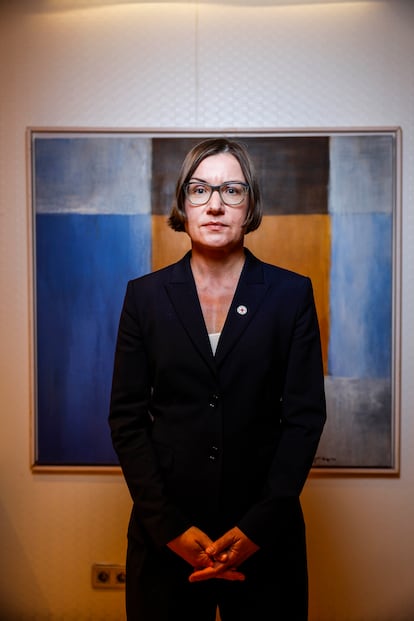Mirjana Spoljaric, president of the Red Cross Committee: ‘Gaza is a paradigm shift because of the high level of destruction’
The Swiss-Croatian diplomat warns against ‘dehumanizing’ the other side in times of war, and the risks of artificial intelligence, such as autonomous weapon systems

Mirjana Spoljaric, 51, was born in Croatia, in the town of Ludbreg, but she also has Swiss nationality, an essential requirement to preside over the International Committee of the Red Cross (ICRC), which is based in Geneva. That and the fact that Spoljaric brought together two of the experiences best suited to lead an organization called to protect the victims of war from neutrality — the Swiss diplomatic corps and the United Nations agencies — led to her appointment in October 2022.
She is very cautious in her words and says “protecting humanity” is the key to achieving peace. She prefers not to talk about Israel’s accusations against the U.N. agency for the Palestinians (UNRWA), where she herself worked a little over a decade ago. But she is clear that humanitarian assistance has become a target in conflicts in one way or another, and not only in the Middle East.
Seventy-five years have passed since the signing of the Geneva Conventions, the core of international humanitarian law or, in other words, the rules of war, which the ICRC tries to monitor. The current situation is less than encouraging. Spoljaric warns: “If we throw these mechanisms that were created after the Second World War under the bus now, we will not be able to recreate them.”
Question. In the interview I did a couple of years ago with your predecessor, Peter Maurer, we also started by talking about Gaza. Is it the most difficult conflict for the ICRC?
Answer. What we have been observing over the last 10 to 12 months is a fast escalation of large-scale, very complex, very high-intensity conflicts. Sudan started before Gaza, but then Gaza came after Ethiopia. Then there was an earthquake falling on 10 years of protracted conflict in Syria, a fast escalation in Myanmar. Gaza is a paradigm shift because of the high intensity, the high level of destruction and the active impediment of humanitarian assistance. But what we measure in Gaza is higher per capita than in other places, in terms of damage and suffering and loss. What we have to acknowledge in Gaza is that all this is happening under the watch of the international community, and still, the situation continues to deteriorate in horrific ways. You see people suffering more and more every day, and less and less capability of preserving dignity, apart from a lack of security, lack of water, lack of nutrition, lack of health, lack of shelter
It will haunt us for quite some time to come. There are two lessons learned in Gaza: one is when there’s no compliance with international humanitarian law, you see the damage increase, you see civilian loss increase. But what we also learn is that without the direct influence of the state parties to the Geneva Conventions [which regulates the treatment of non-combatants in a war] humanitarian actors lose weight, authority, security, and ultimately credibility. What you have heard throughout this conflict is, ‘oh, the humanitarians need to do more. Oh, we have to step up humanitarian assistance.’ But how can we, if opening the borders is linked to political negotiations? We’ve come under attack repeatedly. Many humanitarians have lost their lives. You cannot separate humanitarian assistance from political negotiations anymore. And that makes our work extremely more complex
Q. Did you expect more from the international community?
A. Yes, I expect the international community to declare compliance and implementation of international humanitarian law their political priority. We have to invest much more upfront, in compliance with the law, in accountability systems, to prevent lawlessness when conflict arises, because conflict is not a lawless space. The Geneva Conventions were created precisely is to avoid war at all costs and with all possible means. You cannot dehumanize and completely destroy the other side without questioning the legal system that was created on the basis of the experience of the Second World War.
Q. The ICRC is synonymous with neutrality and credibility, but it is also the target of disinformation. Has there ever been a campaign against your organization like the one in Gaza?
A. What we observed in Ukraine was a high intensification of misinformation with regards to humanitarian actors generally, but then specifically with the ICRC. Much of this happens through social media campaigns and with the support of artificial intelligence. This has amplified during the conflict between Israel and Hamas. It’s becoming a serious issue for us because our offices were vandalized during the protests. There are hate campaigns against individuals, including myself. The security of our personnel is at stake, and this is not something we can neglect anymore. There’s nothing worse than creating false stories about those who are unarmed, who go unarmed into a situation of conflict to help other people. Without confidentiality, [the ICRC] cannot remain fully neutral. Attacking these two criteria is also not the right way to go because without our neutrality we lose the credibility and the legitimacy to operate in situations of our conflict. We lose the possibility to fulfill a mandate that was given to us by all states through the Geneva Conventions.
Q. The role of the ICRC is fundamental in Ukraine. Is access to prisoners of war your biggest challenge?
A. We work with the Ukrainian Red Cross to provide water, food, cash assistance. We also work to re-establish family links. There is a growing number of missing people. We work on exchange of bodies, on accessing prisoners of war in general. And we work with the sides on how they can ensure better protection of civilians. The parties need to recognize that it is in their interest to work with the ICRC to ensure protection of civilians and adequate treatment of prisoners of war. Ultimately, it serves them if on the other side the same treatment is granted to their own nationals. International humanitarian law is not transactional. Obligations are always obligations. If the sides uphold these minimum standards, it will be easier to return to the negotiation table.
Q. But can you access prisoners of war from both sides?
A. We never have full access to exercise our mandate as is written. In every conflict that you see in the media, our work has become increasingly more difficult.
Q. There are wars that don’t appear in the media as often, such as the one in Sudan. In a recent statement, you said that humanitarian action there is “politicized.” What did you mean?
A. What we increasingly see is that humanitarian assistance is being instrumentalized to put pressure on the other party to a conflict. This is nothing new. It happens in every conflict. What we see now is that this is systematically a pattern that hampers our work. We are becoming deliberately subject to military strategies. We are forced to bend our rules in the eyes of the parties to conflict so that they can continue to pursue their military objectives. What you see is a deprivation of access to certain populations, a dehumanization of the other populations saying, ‘oh, they are all combatants,’ which is then making it very difficult for us to operate because our colleagues are in danger.

Q. The role of artificial intelligence in war is of concern to the ICRC. It is calling on governments to regulate its use. What response have you received?
A. What we are looking at specifically is so-called autonomous weapon systems. I issued a joint call with the U.N. Secretary General last year calling for a normative framework to regulate autonomous weapon systems. There are specific weapon systems that we think should be prohibited. They are unpredictable, using integrated forms of machine learning that learn about the target as they are already launched and weapon systems that autonomously target humans. What constitutes a big challenge for us is the loss of human control and accountability over the employment of weapons. You cannot export that decision-making to a machine or a computer or a software. What we also fear is that as you support military operations with artificial intelligence-based tools, you lose control over the human cognitive capacity to absorb the level of information needed in a short period of time to make decisions. What we also observe is a loss to distinguish between human harm and material harm, as well as the risk of something being programmed in the wrong direction and not being able to be reversed.
Q. Seventy-five years after the Geneva Conventions, which established the work of the ICRC, the number of civilians killed in conflicts remains extremely high. If the law is clear, where is the problem?
A. We work more on the preventive side than on the actual conflict, and we don’t work on the court side. It’s primarily the national state that has to prevent these violations by implementing these international agreements and being ready for times of conflict to avoid civilian casualties. The ICRC wasn’t designed to prevent conflict; it doesn’t quantify acceptable civilian casualty levels. A politician, a lawmaker, will always find interpretations of the law that allow them to say, ‘we are in full compliance [with the Geneva Conventions].’ We are at a crossroads. I’m calling on the politicians to ask themselves, are you content with the letter of the law? Or do you want to prevent the moral failure that is unprecedented? The universal principle of protecting humanity, enshrined in the Geneva Conventions, is the pathway back to peace. States will have to come back to the negotiation table. The big powers have something in common to start with: the humanitarian principle. That is what they agreed on after the Second World War. And nobody has broken that promise yet, even though the reality looks much different.
Sign up for our weekly newsletter to get more English-language news coverage from EL PAÍS USA Edition
Tu suscripción se está usando en otro dispositivo
¿Quieres añadir otro usuario a tu suscripción?
Si continúas leyendo en este dispositivo, no se podrá leer en el otro.
FlechaTu suscripción se está usando en otro dispositivo y solo puedes acceder a EL PAÍS desde un dispositivo a la vez.
Si quieres compartir tu cuenta, cambia tu suscripción a la modalidad Premium, así podrás añadir otro usuario. Cada uno accederá con su propia cuenta de email, lo que os permitirá personalizar vuestra experiencia en EL PAÍS.
¿Tienes una suscripción de empresa? Accede aquí para contratar más cuentas.
En el caso de no saber quién está usando tu cuenta, te recomendamos cambiar tu contraseña aquí.
Si decides continuar compartiendo tu cuenta, este mensaje se mostrará en tu dispositivo y en el de la otra persona que está usando tu cuenta de forma indefinida, afectando a tu experiencia de lectura. Puedes consultar aquí los términos y condiciones de la suscripción digital.









































